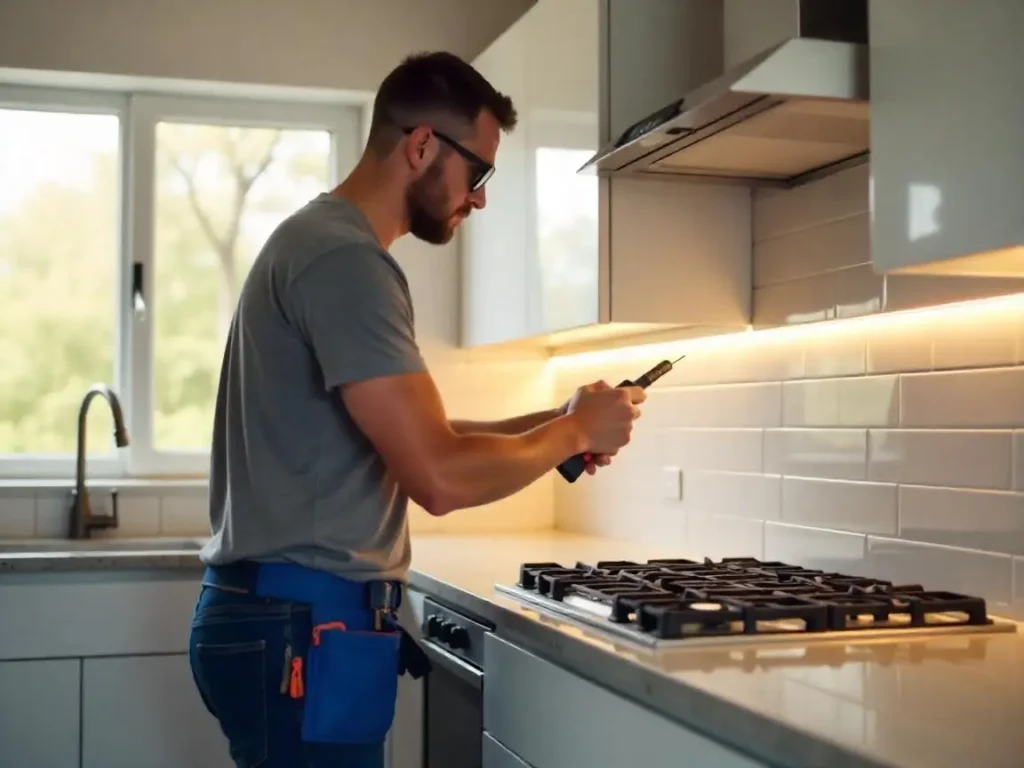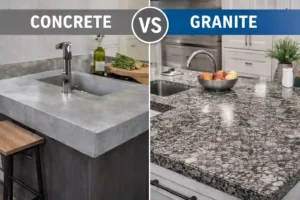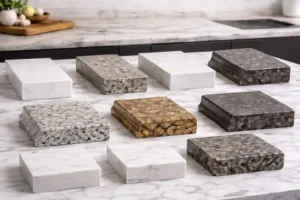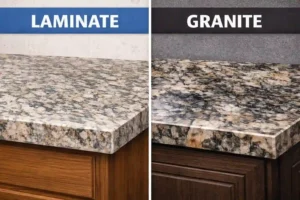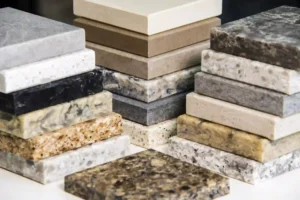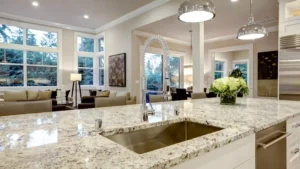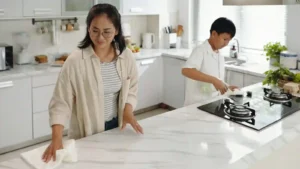A backsplash is the decorative and protective barrier behind your countertop, crucial for keeping your walls safe from water splashes, grease, and other kitchen mishaps. Not only does it enhance the look of your kitchen or bathroom, but it also preserves the wall’s integrity over time. Accurate measurements save time, money, and prevent wasted materials. In this guide, you’ll learn how to measure for a backsplash, including the right tools, detailed processes, budgeting tips, and troubleshooting advice, ensuring you confidently calculate backsplash square footage for your tile installation.
How to Measure for Backsplash?
To measure for a backsplash, begin by measuring the height (from countertop to the bottom of the cabinets) and the total width of your chosen area. Multiply these dimensions in inches and then convert the total by dividing by 144. For example, 18 inches by 36 inches equals 648 square inches, which equals 4.5 square feet when divided by 144. This process helps you calculate backsplash square footage and is essential when figuring out square feet for tile. With these basics in place, we now move to tool selection and layout preparation.
Table of Contents
ToggleTools and Materials You’ll Need
Given are the tools and materials required to measure backsplash:
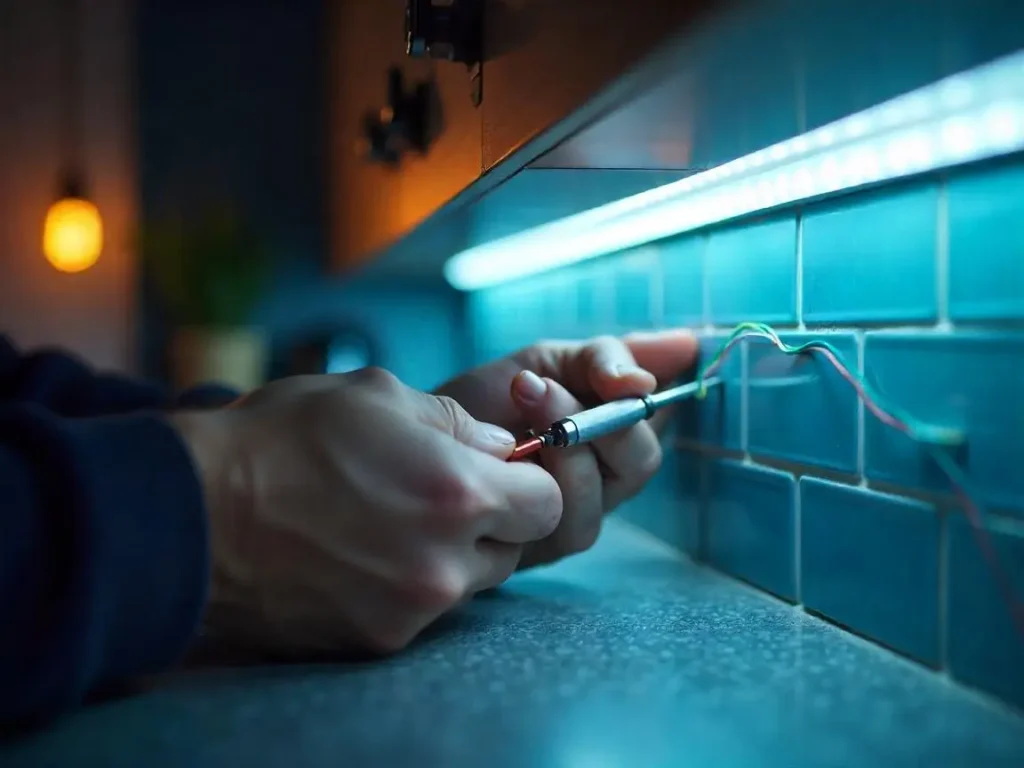
Essential Measurement Tools
Gather a high-quality measuring tape, pencil, notepad, and a reliable calculator (or a digital backsplash calculator app) to ensure precision. These tools help you accurately measure for a backsplash and lay the foundation for your project.
Additional Aids and Safety Gear
A level, chalk line, dry-lay templates, and graph paper assist in mapping your area and verifying your calculate backsplash square feet process. Use gloves and protective eyewear, particularly when cutting tile, to keep the project safe and professional.
Preparing Your Work Area
In order to prepare the work area, follow the given process:
Clearing and Cleaning the Surface
Before starting, remove any obstacles such as appliances, wall hangings, or furniture near the backsplash zone. Clean the wall thoroughly to eliminate grease, dust, and debris that might affect your measurements and tile adhesion.
Documenting the Layout
Sketch a scaled diagram or create a digital layout of your backsplash. Mark key elements like outlets or windows. This detailed planning is critical when you measure for a backsplash, ensuring every inch is accounted for.
Creating a Dry Lay
Arrange your tiles without adhesive a dry lay to visualize your design and confirm your measurements. This step reinforces your approach to calculate backsplash square footage accurately before any permanent work begins.
Step-by-Step Backsplash Measurement Process
Following are the step-by-step process for backsplash measurement:
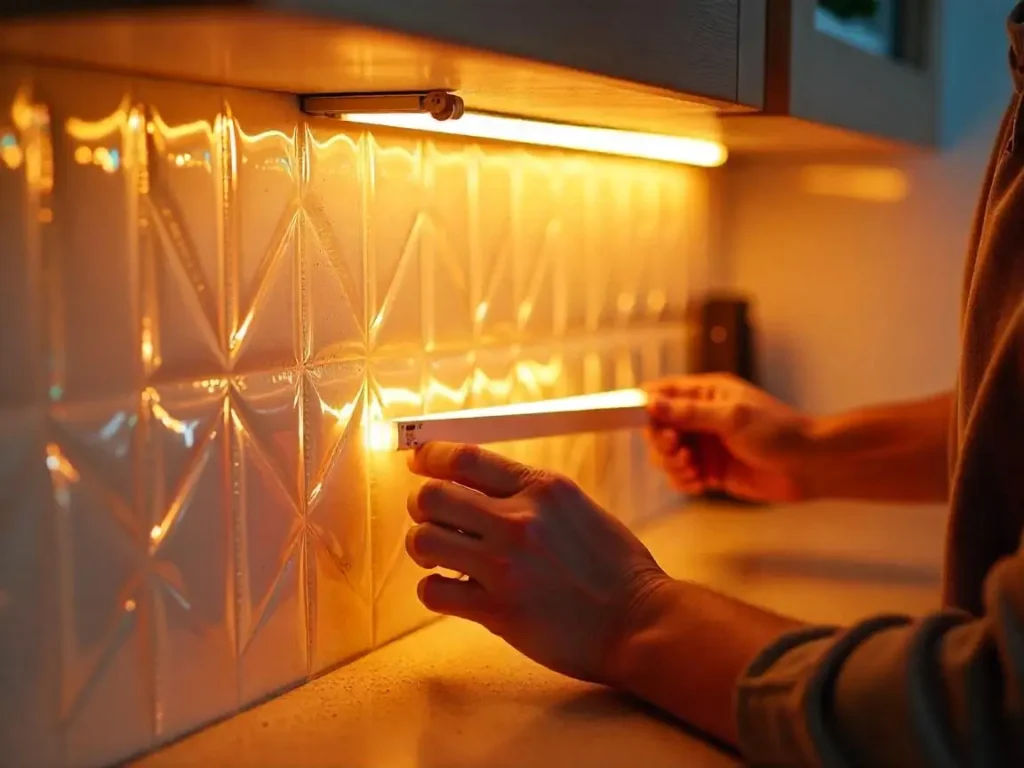
Sketching and Planning Your Layout
Start by drawing a scaled diagram of your backsplash area. Divide the wall into manageable sections if there are interruptions (such as cabinets or windows). This planning ensures precision, especially when figuring out square feet for tile in complex spaces.
Measuring Height and Width
Vertical Measurement
Measure from the countertop to the lower edge of the upper cabinets (or to your desired top edge). A clear vertical measurement is vital when you measure for a backsplash.
Horizontal Measurement
Measure the full length of the wall, noting any interruptions. This horizontal dimension contributes directly to your calculate backsplash square feet calculation.
Handling Irregular Shapes and Obstacles
For areas with curves or angles, use a flexible tape measure and break the area into smaller, rectangular segments. Subtract areas that won’t be tiled, like windows or outlet spaces, ensuring you accurately calculate backsplash square footage even in irregular sections.
Calculating the Total Area and Material Needs
Given are the materials needed for calculating the total area:
Converting Measurements
Multiply your measured height by the measured width (both in inches) to get the total square inches. Then, divide that number by 144 to convert it to square feet. For example, if 18 inches x 36 inches equals 648 square inches, then 648 divided by 144 gives you 4.5 square feet. This method helps you calculate backsplash square feet efficiently.
Determining Tile Quantity
Tile-Specific Considerations
Based on the tile dimensions, determine how many tiles you’ll need to cover your calculated area. Use your measurements when figuring out square feet for tile to understand if one tile covers the necessary area or if additional cuts are required.
Adding Overage
It is essential to order an extra 10% to 15% (up to 20% for complex layouts) to cover cutting errors, breakage, and future repairs. This extra helps ensure you always have sufficient material without disruptions in your project.
Advanced Tips and Techniques
Here are the advanced tips and techniques:
Using Technology and Digital Tools
Leverage online backsplash calculators and downloadable templates to streamline your process. Many mobile apps allow you to measure for a backsplash digitally, ensuring precision when you calculate backsplash square footage.
Visual Planning Aids
Utilize infographics, dry-lay photos, and video walkthroughs to guide your measurement process. These visual aids enhance understanding and provide real-life examples, making figuring out square feet for tile simpler and more effective.
Troubleshooting Common Measurement Errors
Double-check every measurement and use multiple methods if needed to avoid errors. Be mindful of unit conversion mistakes, especially when converting inches to square feet, ensuring your calculate backsplash square feet process is error-free.
Budgeting and Cost Estimation
Given are the budgeting and cost estimation to measure the backsplash:
Estimating Costs Based on Measurements
Accurate measurements allow you to control material costs and minimize waste. Use your calculated backsplash square feet to estimate the overall tile cost based on the price per square foot.
Material and Waste Cost Considerations
Factor in extra tile costs for overage. By anticipating potential mistakes, you ensure your budget covers all required materials.
Tips for Saving Money
Order slightly more than calculated to take advantage of return policies on unused tiles. Consider repurposing leftovers and, if needed, allocate funds for professional support to keep your project efficient and cost-effective.
Elevate Your Kitchen with SF Marble & Granite in Lowell
At SF Marble & Granite, we don’t just provide tile we bring your vision to life. When it comes to backsplash installation in Lowell, we understand the local charm, whether you’re updating a classic New England kitchen or refreshing a sleek modern space. Our team blends craftsmanship with local know-how to ensure your backsplash not only fits it shines. Let’s make your kitchen truly yours.
Conclusion
Careful planning and precise measurement are vital to a successful backsplash project. In this guide, we’ve walked you through each step from how to measure for a backsplash and sketching your layout to advanced techniques using digital tools. Accurate calculations, such as how to calculate backsplash square feet and how to figure out square feet for tile, ensure a smooth DIY experience. Remember, every little detail counts. Contact us today!
FAQs
What Is The Formula For Converting Inches To Square Feet?
Multiply the height by the width (in inches) to get the total square inches. Then, divide that number by 144 to calculate how many square feet the area covers. This is essential to calculate backsplash square footage.
How Do I Measure For A Backsplash If My Wall Is Irregular?
For irregular walls, divide the backsplash area into smaller, manageable sections. Measure each section’s height and width, subtract any areas that won’t be tiled (like outlets or windows), and then add up the total. This ensures you accurately measure for a backsplash even in tricky spaces.
Why Should I Add Extra Tile When Ordering?
Adding extra (usually 10% to 15%) helps cover any cutting errors, breakage, or future repairs. This extra material is critical when figuring out square feet for tile as it prevents the hassle of ordering more if mistakes occur.
Can I Use Digital Tools To Assist With Backsplash Measurements?
Absolutely! Many online backsplash calculators and mobile apps can help you calculate backsplash square feet and verify your manual calculations, making the process easier and more accurate.
How Do I Determine How Many Tiles Are Needed For My Backsplash?After measuring the total area (in square feet), determine the area covered by one tile based on its dimensions, and then divide the total area by the tile’s area. Remember to include an overage percentage to account for waste. This helps ensure you’re not short when figuring out square feet for tile.

